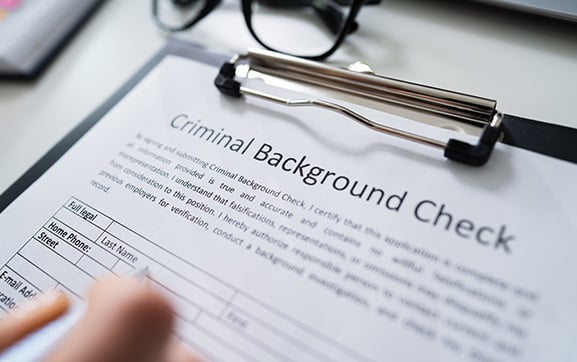Criminal Background Checks
Fast and compliant criminal history checks arm your business with critical insights from a candidate's past so you can make better hiring decisions.



Criminal Background Check Software for Hiring Peace of Mind
Understanding a candidate's past is essential to the hiring process. But what does a criminal background check for employment reveal?
- Alias & identity verification
- National criminal database searches
- Civil, county, state & federal court records
- DOJ sex offender registry check
Criminal record checks are just one offering in Foley’s suite of background checks.

What Sets Foley’s Criminal History Checks Apart?
What Sets Foley’s Criminal History Checks Apart?
Industry-Leading Turnaround Times
You don’t have to forgo criminal record checks to avoid slowing down your hiring process to a screeching halt. Get the insights you need to make better, faster hiring decisions.
Reliable Federal Compliance
Foley’s criminal background check for employers follows FCRA, EEOC, and adverse action requirements, and we help you navigate the process in a legal and compliant manner.
Technology Meets Expertise
Foley’s background checking software is integrated with over 1,000 county, state, and federal court jurisdictions, as well as an extensive network of court researchers.
Long-Term Employee Monitoring
Add Foley’s ongoing monitoring to keep tabs on the behaviors of current employees so you're alerted of issues before they impact the workplace.

Understanding What Shows Up on a Criminal Background Check
Get the answers to some of the most common questions associated with the criminal record check process.
Criminal Background Checks for Employment in All Industries

Prevent Elder Abuse & Minimize Liability
Personal client information, medications, and sensitive legal documents may be placed in the hands of your caregivers. Ensure you’re hiring trustworthy professionals who have only the best intentions in mind for your clients.

Protect Your Retail Store from Theft & Damages
Hiring an individual who may steal from your company could lead to significant losses. Criminal history checks find any recordable instances of theft or grand larceny.

Verify the Identities of Construction Candidates
Confirming a candidate’s identity is crucial to ensuring they have the required experience and credentials for the job. With so much at stake, simply running a criminal background check upholds your high standards.
×
Fill out this form and a member of our team will reach out shorty.
Get Your Free Background Check Software Demo
Fill out the form to jumpstart your hiring process and ensure candidates’ histories match your company values with our background checking software.
.png)
Whether you’re looking for a quick background check, or a comprehensive DOT compliance solution, Foley can help.


